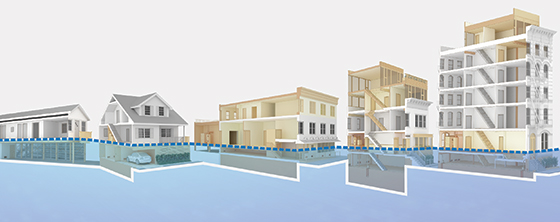The New York City Department of City Planning (DCP) has released "Retrofitting Buildings for Flood Risk," a comprehensive guide for New York City owners of buildings in flood zones.
Part of the city’s response to widespread flooding as a result of Hurricane Sandy, the manual offers retrofitting strategies that will enable home and property owners to reduce the risk of damage and disruption from coastal flooding.
Recent Congressional legislation reforming the National Flood Insurance Program will increase flood insurance premiums for buildings that are not retrofitted, according to a city press release. These increased premiums will directly impact neighborhood stability and housing affordability, especially for working class New Yorkers, the release says.
The manual contains some simple and low-cost actions New Yorkers living in the flood zone can take now to begin to adapt and protect their homes against flooding.
“Incorporating these improvement will help protect our city’s buildings against potential future extreme climatic events,” says Department of Buildings Commissioner Rick D. Chandler. “The Department of Buildings will provide dedicated plan examiners and inspectors to work with and support home and business owners in redesigning their structures to meet the new federally mandated guidelines.”
Related Stories
Resiliency | Jan 2, 2024
Americans are migrating from areas of high flood risk
Americans are abandoning areas of high flood risk in significant numbers, according to research by the First Street Foundation. Climate Abandonment Areas account for more than 818,000 Census Blocks and lost a total of 3.2 million-plus residents due to flooding from 2000 to 2020, the study found.
Sustainability | Jan 2, 2024
Los Angeles has plan to improve stormwater capture and source 80% of water locally
Los Angeles County’s Board of Supervisors voted for a plan to improve stormwater capture with a goal of capturing it for local reuse. The plan aims to increase the local water supply by 580,000 acre-feet per year by 2045.
MFPRO+ News | Jan 2, 2024
New York City will slash regulations on housing projects
New York City Mayor Eric Adams is expected to cut red tape to make it easier and less costly to build housing projects in the city. Adams would exempt projects with fewer than 175 units in low-density residential areas and those with fewer than 250 units in commercial, manufacturing, and medium- and high-density residential areas from environmental review.
Urban Planning | Jan 2, 2024
Federal Highway Administration releases updated traffic control manual
With pedestrian deaths surging nationwide, the Federal Highway Administration released a new edition of the Manual on Uniform Traffic Control Devices for Streets and Highways. The manual contains standards for street markings and design, standardizing signage, and making driving as seamless as possible.
Engineers | Dec 22, 2023
ACEC report identifies opportunities for improving diversity for engineering firms
The ACEC Research Institute recently released a Diversity Roadmap presenting the state of diversity, equity, inclusion, and belonging (DEI&B) in the engineering industry.
Contractors | Dec 22, 2023
DBIA releases two free DEI resources for AEC firms
The Design-Build Institute of America (DBIA) has released two new resources offering guidance and provisions on diversity, equity, and inclusion (DEI) on design-build projects.
MFPRO+ News | Dec 22, 2023
Document offers guidance on heat pump deployment for multifamily housing
ICAST (International Center for Appropriate and Sustainable Technology) has released a resource guide to help multifamily owners and managers, policymakers, utilities, energy efficiency program implementers, and others advance the deployment of VHE heat pump HVAC and water heaters in multifamily housing.
Sustainability | Dec 22, 2023
WSP unveils scenario-planning online game
WSP has released a scenario-planning online game to help organizations achieve sustainable development goals while expanding awareness about climate change.
MFPRO+ News | Dec 18, 2023
Berkeley, Calif., raises building height limits in downtown area
Facing a severe housing shortage, the City of Berkeley, Calif., increased the height limits on residential buildings to 12 stories in the area close to the University of California campus.
Green | Dec 18, 2023
Class B commercial properties gain more from LEED certification than Class A buildings
Class B office properties that are LEED certified command a greater relative benefit than LEED-certified Class A buildings, according to analysis from CBRE. The Class B LEED rent advantage over non-LEED is about three times larger than the premium earned by Class A LEED buildings.

















